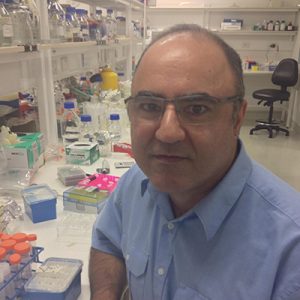
Dr Charles Galea from Monash University is investigating novel compounds that could lead to the development of new therapies for treating MS. Effective and low-cost treatments for MS are urgently needed, especially those targeting the progressive MS symptoms. Not only would this approach reduce the overall economic burden of disease, but more importantly, it would improve quality of life for patients and their families.
Immune cells involved in the development of MS have specific channels on their surface that are essential for their function. These channels form a pore on the cell surface, which allow chemical messengers (potassium) to pass through. Dr Galea’s previous work has shown that drugs blocking these channels on immune cells were associated with reduced MS-related symptoms in an animal model of MS. Importantly, this treatment only affected immune cells involved in the development of MS and not other immune cells important for combatting bacterial or viral infections and cancers.
Venom extracted from cone snails is known to contain a large number of compounds that can block these cell channels. Dr Galea’s project will develop methods to identify potential therapeutic compounds in cone snail venom, and test their ability to block channels on disease-causing immune cells. These compounds will provide the basis for future research aimed at identifying new therapeutic drugs with improved properties (for example, drugs that could be taken orally and have fewer side-effects compared to existing drugs).
In this incubator grant, Dr Galea aimed to screen cone snail venom for potential therapeutic peptides, and to determine the ability of these peptides to block disease-causing potassium channels. During this project, Dr Galea optimised the conditions for screening and identifying peptides that bind to disease-causing potassium channels. In the first stage of this project, Dr Galea screened the cone snail venom looking for these peptides. Unfortunately this screening did not identify any compounds that were able to block potassium channels, and so the second stage of the analysis was redirected towards other potential sources of these peptides. Dr Galea is now studying venom extracted from the sea anemone to identify if this venom holds greater potential for producing potassium channel blockers.
Testing unique and novel sources for potentially active chemical compounds is crucial to expand the range of therapies available for people with MS. These compounds will provide the basis for future research aimed at identifying new therapeutic drugs with improved properties (for example, drugs that could be taken orally and have fewer side-effects compared to existing drugs).
Updated: 12 April 2016
Updated: 03 January, 2014

